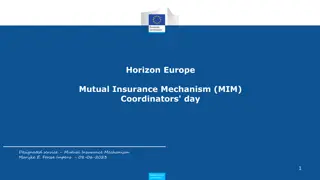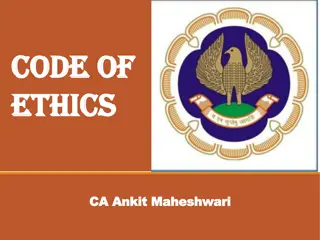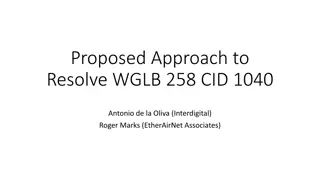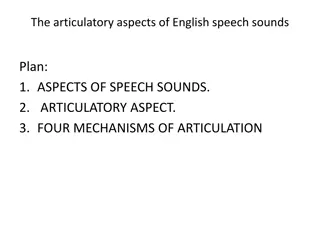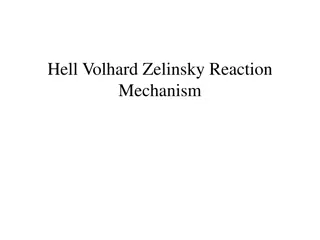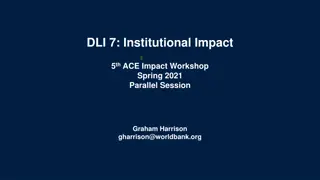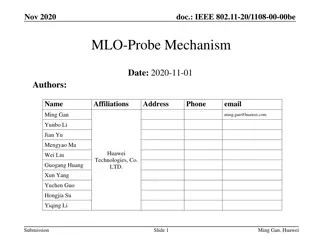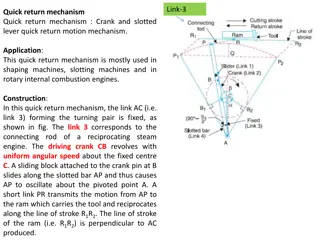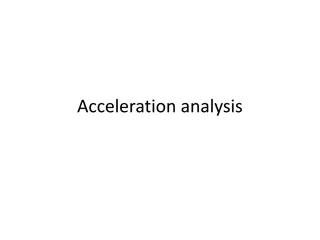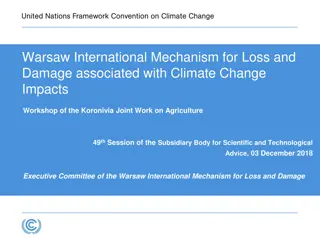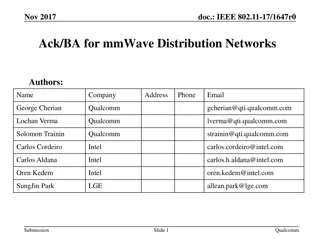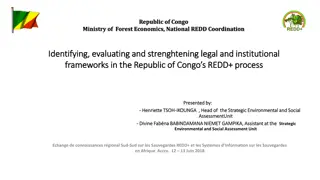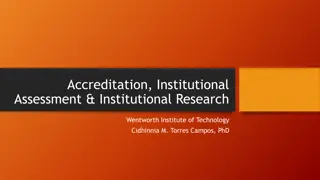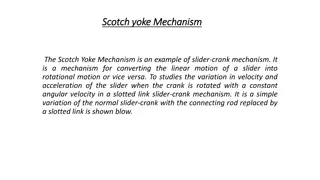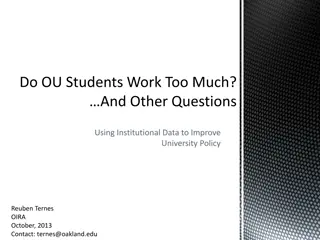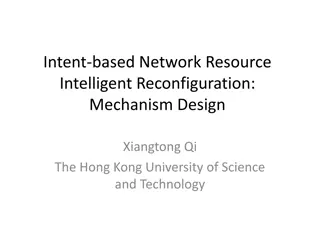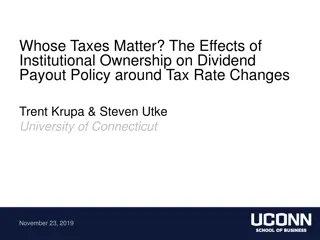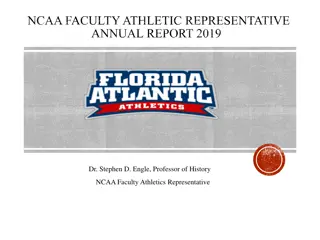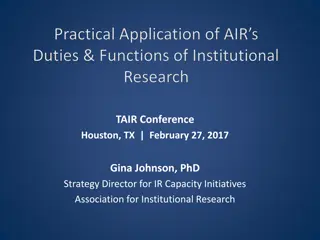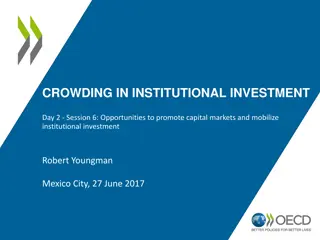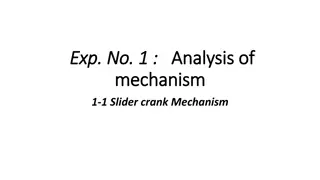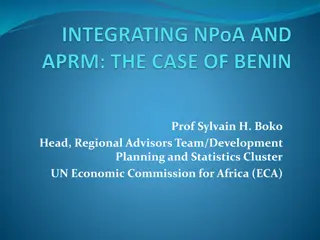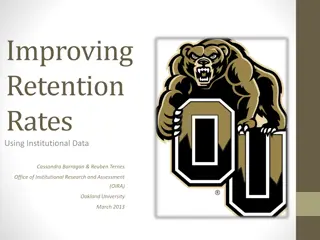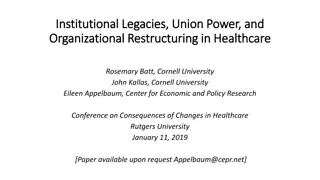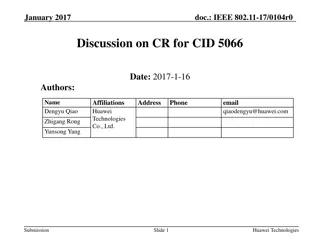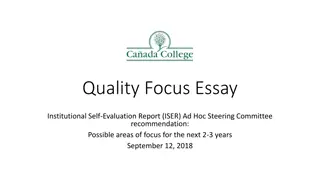Carbon Border Adjustment Mechanism (CBAM)
Get an overview of the EU's Carbon Border Adjustment Mechanism (CBAM), its global context, the need for its implementation, and the challenges faced during its design. Find out when it will come into force and the details of its adoption process.
7 views • 24 slides
INSTITUTIONAL GOVERNANCE FRAMEWORK
Currently, there is a lack of formal structure in the Institutional Housing Governance Framework (IHGF) within the public service system, leading to inefficiencies in managing institutional housing policies. This absence has resulted in deteriorating state assets, unmet housing demands, and ineffect
0 views • 17 slides
Overview of Compliance, Quality Assurance, Ethics, and Disciplinary Mechanism in ICAI
This content discusses various aspects of compliance in the Chartered Accountants sector, including the Quality Assurance Mechanism, Code of Ethics, Disciplinary Mechanism, and details on who can file complaints. It also highlights the amendments in the Chartered Accountants, Cost and Works Accounta
5 views • 37 slides
Carbon Pricing Overview and EU Green Deal Agenda
The overview of carbon pricing inside the EU highlights key aspects such as the EU Green Deal, revision of the EU ETS, and the Carbon Border Adjustment Mechanism. The EU aims for carbon neutrality by 2050 with a 55% reduction target. The Fit for 55 initiative emphasizes relevance for the Energy Comm
4 views • 16 slides
Understanding the Horizon Europe Mutual Insurance Mechanism (MIM)
The Horizon Europe Mutual Insurance Mechanism (MIM) is designed to protect the financial interests of the EU budget by simplifying administrative processes and providing coverage for grants. It started with the FP7 projects and continues through Horizon Europe projects. Any grant previously covered
2 views • 14 slides
Overview of Ethics, Quality Assurance, and Disciplinary Mechanism in ICAI
This information covers the Code of Ethics, Quality Assurance Mechanism, and Disciplinary Mechanism in the Institute of Chartered Accountants of India (ICAI). It includes details on the ethical standards, peer review boards, disciplinary procedures, and who can file complaints. Additionally, it high
1 views • 37 slides
Proposed Approach for MAC Address Assignment in IEEE 802.11
IEEE 802.1CQ is working on a mechanism to assign local MAC address blocks to end nodes specifically related to IEEE 802.11 standards. The current draft lacks a pre-association mechanism for IEEE 802.11 stations to obtain a local MAC address before association. The proposed remedy suggests specifying
6 views • 7 slides
Understanding Articulatory Aspects of English Speech Sounds
Speech sounds are integral to language, with articulatory, acoustic, auditory, and functional aspects. Articulation involves mechanisms like the power, vibrator, resonator, and obstruction mechanisms. The power mechanism includes the respiratory system, while the vibrator mechanism operates through
10 views • 10 slides
Grievance Redress Mechanism: Enhancing Project Efficiency
Understanding the Grievance Redress Mechanism (GRM) is crucial for effective project management. This mechanism aims to address complaints and concerns related to project implementation, ensuring transparency and stakeholder engagement. By sensitizing facility GRM focal persons and following structu
4 views • 26 slides
Inter-Agency SEA Community Based Complaints Mechanism in Nigeria
The Inter-Agency SEA Community Based Complaints Mechanism in Nigeria facilitates safe and confidential reporting of complaints, particularly related to sexual exploitation and abuse (SEA), by beneficiaries. Through inter-agency coordination, this mechanism ensures effective collaboration, messaging,
1 views • 18 slides
Understanding the Hell-Volhard-Zelinsky Reaction Mechanism
The Hell-Volhard-Zelinsky (HVZ) reaction is a unique halogenation method for carboxylic acids at the alpha carbon, involving phosphorus tribromide and bromine. This mechanism, named after its chemists, requires severe conditions and can lead to specific products or limitations such as beta unsaturat
0 views • 8 slides
Maximizing Institutional Impact through ACE Centers of Excellence
ACE Impact Centers of Excellence benefit from strong institutional support and are crucial for catalyzing broader teaching and research excellence. The DLI.7 framework outlines various elements that support global best practices in Higher Education, emphasizing the importance of institutional owners
0 views • 17 slides
IEEE 802.11-20/1108-00-00be MLO Probe Mechanism in AP MLD
This document discusses the design and implementation of a mechanism for a non-AP STA to send a probe request frame to an AP within an AP MLD, allowing the STA to request a probe response containing information on all APs affiliated with the same MLD as the target AP. It proposes the use of new elem
1 views • 12 slides
Understanding Quick Return Mechanism in Machinery
Exploring the application, construction, and velocity analysis of the crank and slotted lever quick return motion mechanism commonly used in shaping machines, slotting machines, and rotary internal combustion engines. The mechanism involves fixed link AC, driving crank CB, sliding block, and short l
8 views • 14 slides
Acceleration Analysis of Slider Crank Mechanism
In this analysis, we calculate the acceleration of the slider at point B, acceleration of point E, and the angular acceleration of the link AB in a slider crank mechanism. The steps involve drawing configuration, velocity, and acceleration diagrams with suitable scales to determine the necessary par
0 views • 12 slides
Warsaw International Mechanism for Loss and Damage: Addressing Climate Change Impacts
The Warsaw International Mechanism for Loss and Damage focuses on addressing climate change impacts, including extreme events and slow-onset events, in vulnerable developing countries. Through its Executive Committee, the mechanism aims to enhance dialogue, understanding, and action to support those
2 views • 11 slides
Advancements in Chemical Mechanisms for Aerosol Effects in WRF/Chem Model
This study focuses on the development of a new chemical mechanism in the Weather Research and Forecasting with Chemistry (WRF/Chem) model to address the underestimation of carbonaceous aerosols. The RACM/MADE/SOA-VBS mechanism incorporates advancements in gas-phase chemistry and particle parameteriz
0 views • 12 slides
Acknowledgment Mechanism for mmWave Distribution Networks
This document discusses the proposal for an Acknowledgment (Ack) and Block Acknowledgment (BA) mechanism for Time Division Duplex (TDD) Channel Access in mmWave Distribution Networks. The requirements for sending Ack/BA in different slot structures to accommodate various traffic profiles are outline
1 views • 12 slides
Exploring Civic Virtue and Institutional Design in Early Modern Governance
Delve into the complexities of civic virtue and institutional design in early modern governance through a 3,000-word essay. Analyze the necessity of civic virtue within the state and consider contrasting perspectives on whether institutional design can replace it. Use primary texts to support your a
0 views • 32 slides
Impact of UN Guidelines on Foster Care and Institutional Care of Young Children in Europe and Central Asia
Professor Kevin Browne and Dr. Shihning Chou conducted a study on the impact of UN guidelines on foster care and institutional care of young children in Europe and Central Asia. The research highlights the physical harm and neural damage caused to children in institutional care without a parent. It
0 views • 11 slides
Strengthening Legal and Institutional Frameworks for REDD+ in Republic of Congo
The Ministry of Forest Economics in the Republic of Congo, along with the National REDD Coordination, is actively identifying, evaluating, and strengthening the legal and institutional frameworks for the REDD+ process. Progress reports highlight the establishment of institutional arrangements, imple
0 views • 10 slides
Institutional Assessment & Research at Wentworth Institute of Technology
Wentworth Institute of Technology excels in accreditation, institutional assessment, and research. The institution's leadership program oversees accreditation efforts to ensure educational effectiveness. They focus on assessing student learning outcomes, measuring educational effectiveness, and cond
0 views • 5 slides
Institutional Assessment and Effectiveness Workshop Achievements at SUNY Oneonta
The Office of Institutional Assessment and Effectiveness at SUNY Oneonta has made significant progress in developing assessment protocols and processes, leading to a culture of assessment. This includes completing planning and assessment cycles, establishing objectives and procedures, and aligning u
1 views • 16 slides
Understanding The Scotch Yoke Mechanism: Experiment and Analysis
The Scotch Yoke Mechanism is a slider-crank mechanism that converts linear motion into rotational motion or vice versa. This experiment involves studying the velocity, acceleration, and displacement of a slider as the crank is rotated with constant angular velocity in a slotted link slider-crank mec
0 views • 5 slides
Utilizing Institutional Data to Enhance University Policy: Insights from Oakland University Research
Extracting valuable insights from institutional data, the Office of Institutional Research and Assessment at Oakland University conducts various research activities to improve university policy. Through surveys and internal research, they address important questions like student workload, financial
0 views • 18 slides
Intelligent Mechanism Design for Intent-Based Network Resource Reconfiguration
An exploration of intent-based network resource reconfiguration through intelligent mechanism design, focusing on concepts such as intent setting, abstract views of intent networks, mechanism design, network traffic control examples, system optimization, and underlying optimization strategies. Vario
0 views • 11 slides
Institutional Effectiveness and Assessment at B-CU
Jennifer Dash, Director of Institutional Assessment, and Dorian Hooks, Institutional Assessment Coordinator at B-CU, lead the efforts in understanding institutional effectiveness and assessment. Capacity building, creating a common vision, and a framework for institutional effectiveness are highligh
0 views • 35 slides
Effects of Institutional Ownership on Dividend Payout Policy
This study examines how a firm's ownership structure, particularly institutional ownership, influences its dividend policy around tax rate changes. It explores the impact of tax-sensitive/insensitive institutional ownership, the role of dedicated institutions as monitors, and the interaction between
1 views • 26 slides
NCAA Faculty Athletics Representative Annual Report 2019
Dr. Stephen D. Engle, a Professor of History, serves as the NCAA Faculty Athletics Representative (FAR) and Chair of the Inter-Collegiate Athletic Committee. The report outlines the general responsibilities of the FAR, including overseeing sub-committees on Academic Performance, Institutional Contro
1 views • 13 slides
Mechanism Design and Auction Theory in Game Economics
Today's lecture covers the concepts of mechanism design and single-item auctions in the field of algorithmic game theory. Mechanism design focuses on reverse-engineering existing game systems to achieve desired objectives, while auctions play a crucial role in various scenarios such as online market
0 views • 30 slides
Role and Functions of Institutional Research in Higher Education
This content discusses the importance of developing duties and functions for Institutional Research (IR) professionals in higher education institutions. It highlights the key responsibilities of IR, such as identifying information needs, collecting and analyzing data, serving as data stewards, and e
0 views • 21 slides
Opportunities to Mobilize Institutional Investment in Capital Markets
Aligning trillions of dollars managed by OECD institutional investors towards green infrastructure investments presents a significant opportunity. Currently, only a small percentage of large pension fund assets are directed towards infrastructure, with an even smaller fraction allocated to green pro
0 views • 4 slides
Analysis of Slider-Crank Mechanism and Experimental Data
Slider-crank mechanism analysis involves understanding the transformation of input motion into desired output motion. This mechanism consists of a crank, coupler, slider, and ground link, converting circular motion into linear motion. Experimental procedures involve setting crank angles and recordin
0 views • 6 slides
The African Peer Review Mechanism (APRM) and Benin's Progression
The African Peer Review Mechanism (APRM) is a governance mechanism voluntarily adopted by African nations to promote democracy, stability, and sustainable development. This article discusses the importance of the APRM, its stages, and Benin's progression within the mechanism, showcasing key indicato
0 views • 17 slides
Understanding Our Political Economy Through Economic Theory and Price Mechanism
Explore the intricate dynamics of political economy through neoclassical economic theory, price mechanism analysis, and the role of land as a factor of production. Delve into concepts like labor demand, capital goods, credit markets, and the limitations of the price mechanism in certain contexts. In
0 views • 30 slides
Enhancing Student Retention Rates through Institutional Data Analysis
Explore how Oakland University's Office of Institutional Research and Assessment leverages various data sources, policy analysis, and predictive modeling to improve student success and retention. Discover the role of IR offices, available resources, survey data, and the importance of collaboration f
0 views • 33 slides
Critique of Transatlantic Trade & Investment Partnership (TTIP) and ISDS Mechanism
The content discusses the concerns and criticisms surrounding the Transatlantic Trade & Investment Partnership (TTIP) and the Investor-State Dispute Settlement (ISDS) mechanism. It highlights issues such as undemocratic practices, economic myths, impacts on workers' rights, safety regulations, clima
0 views • 44 slides
Examining Union Power and Institutional Legacies in Healthcare Organizational Restructuring
Challenges faced by healthcare unions due to institutional legacies and shifts in the healthcare system are explored. The study delves into the variation in union success, emphasizing local institutional contexts in the U.S. and power dynamics between employers and unions rooted in historical contin
0 views • 16 slides
Discussion on Improving Transmission Efficiency in IEEE 802.11 TWT Mechanism
This document proposes enhancements to the IEEE 802.11 TWT mechanism to address issues related to random access Resource Units (RU) utilization. By defining a mechanism to optimize RU allocation for TWT scheduled STAs, the proposal aims to improve transmission efficiency and power saving, particular
0 views • 11 slides
Institutional Self-Evaluation Report: Quality Focus Areas for Future Growth
The Institutional Self-Evaluation Report recommends key focus areas for the next 2-3 years to enhance student learning and achievement. Projects include addressing barriers to entry, streamlining processes, enhancing student support programs, and improving institutional effectiveness through plannin
0 views • 5 slides




